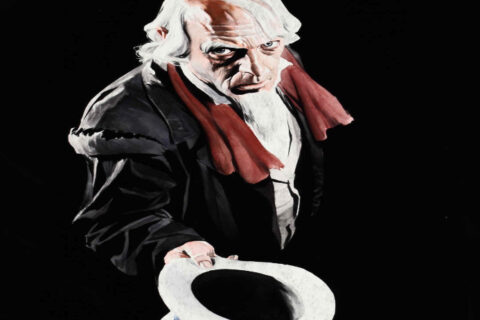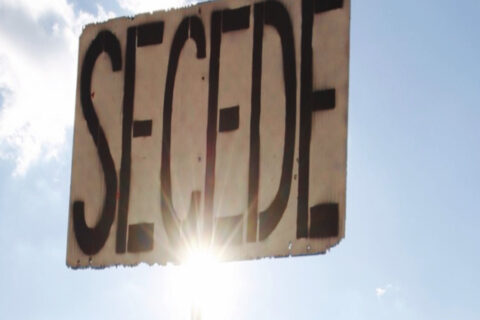Have you ever wondered why you are here, why you would be reading a blog dedicated to dissident thought? If I would guess, it’s likely the same reason the contributors write for this this blog, too. You have a restlessness in your soul, a need to see wrongs righted, an obligation to have the truth known, and you still have a sense of honor. Instead of just melding into the ethos of modernity, never questioning the status quo, something itches at you. And here you find solace, a place for your conscience to get a comforting scratch.
Recently, I was privileged to be invited to contribute to a project, one which turned out to be a fantastic book. Many of you have already bought and read The Honorable Cause: A Free South, and I’d personally like to thank you. I honestly thought the book would be a disjointed collection of essays and off focus, since the writers randomly picked the subjects for their essays. Basically, we all got to scratch our own itches, but the final product did much more. For myself, it scratched a lot of itches.
From start to finish, the book just flows. James Edwards‘ opening essay tugs at the heart of every true Southerner, with recollections and quotes that, honestly, had me misty eyed. Mrs. O’Hara had me remembering my grandmother’s and aunt’s kitchens, and longing for the smells and tastes from the recipes they were more than happy to pass down to the next generations. But just between us, none of the wonderful ladies in my family can capture the perfection of the biscuits those two matriarchs created. Harry Bluff, with the precision of an English barrister, laid plain our argument for a Free Dixie, and from our most perfect sources of truth. Neil Kumar, a young man whose career we should all follow going forward, picked up a stone and threw it at the glass fallacy that White Nationalists and Southern Nationalists view the world through the same window. My essay comes next, a pallet cleanser of mythical fiction, a break from the academic, allowing the reader to recline and take another sip of whiskey (or sweet tea) before being engrossed in the ideological and practical challenges to come.
Launching back into the red meat of the book, Jude Ruffin arrests our souls again, reminding the reader that true Dixie has always had a remnant, and though our foes have tried their damnedest, we are still here and still distinct. Dr. Hill, as he has done for decades, articulates the organic nature of our people, our natural fraternity and paternity, one not limited to mere ideology nor philosophy, but that which defines us down to our very genetic memories. Anne Wilson Smith invokes a remembrance of what “nation” means, and what we are as Southerners and that we shall always be such, even as this American Empire collapses. Mr. Dirtwater, in his own Tidewater aristocratic and genteel way, compels us into recollections of our better ancestors, that we are more than a McDonald’s Happy Meal, or a Netflix binge watch, for we are Southerners, and we must carry ourselves accordingly. Harmonica uses his unique style of exhaustive investigational research to expose the enemies of a Free South, and revealing the hidden jealousies of our inferiors, especially the antifa cretins. In what I found to be a fluid disposition, Rebecca Dillingham makes the argument, and I would agree on principle, that the South has been crippled by our denominational diversity. Although I do not agree with her conclusion that Orthodoxy is the cure, myself being more in favor of a blend of Southern Presbyterian theology and Anglican liturgy (I attend such a church); I absolutely agree that stability in the churches of the South must be addressed.
The last scratch to the constant itch that many reading Identity Dixie long for is in the last essay. Padraig Martin gives a vision for practical secession. As a movement, we must be big, yet small, anti-fragile with many organizations, all working toward a single goal. Having known him for years and discussed these ideas many times, I believe his conclusions are workable avenues to Southern freedom. Of course, for a more detailed account of these ideas, I would encourage everyone to buy, read, and then pass the book to others within your sphere.
My writing for ID has been defined by the editors as “evergreen,” and I would like to think that compliment defines my work as timeless. Below is an edited poem I wrote years ago, long before any of this started, but I believe it speaks to the subject of the article, the restlessness of our souls, and why we long, hope, and work for a better tomorrow for our people.
“The Restless Soul”
An open door
to walk right through,
The swung-wide gate
you never knew.
Locked in caution,
to all you thought.
An untraceable pathway,
you never sought.
In blinding rain
are storm swept tears.
Where the here to now,
move timid fears.
The cautious ride,
would move the walk.
In shadow an image,
would blanket, stalk.
A peaceful way,
the straightest, for sure.
Yet, the turbulent road
feels the cure.
The restless soul
all would have tamed,
but that’s no path,
for history’s fame.

Service to God and honor to the South.






My ancestors hit the coast of Louisiana in 1792. The food they arrived with, the food they worked for, the food they caught and the food they consumed was meal to meal. The plantations needed no labor because the whole western hemisphere was enjoying the slave trade adopted from the African cultures, both north and south did. Still, it was an opportunity to escape the prejudiced social structures of Europe. Those who survived the embattled landscape, terrorized by the British, the Spanish and the French, eventually got cornered by the parasites from London sent here to the US to keep London in position as the facade for their game of usury. Since the South was threatening their financial fuckery that the New Yorkers were complicit in, my ancestors were left in their graves in Vicksburg defending a man’s right to prosper according to his will and willingness to sacrifice. Their game of altering who receives the time value of money, dominated by who controls the press has never been more obvious than it is today. The only solution is to bond together under the banner of Soldiers of God, rally the good ole boys and do what my ancestors did. Go meal to meal, and demand tangible assets for your sacrifice. Their game is predicated upon valueless assets and redefining piety. Also, keep an eye on the force behind the political facade. Remember, the first to show up with carpetbags were on Southern Territory while southerners were still being persecuted by regiments of the Union Army, so by that only the Confederate Army surrendered. The South was still engaged in a battle and not by choice. It still is today.
Very good observation that while the Confederate Army surrendered, the South did not enjoy a ceasefire. The South has been under attack since 1861; and it’s past time Southerners recognize that.
Restless souls, yes. 100% yes
The age we live in, at least in the USA, is not so far physically dangerous, as its currently physically dangerous to be living in the Ukraine. But it is definitely mentally dangerous. There are 1001 things in our daily lives, each one of them fairly insignificant, that add up to a death-by-1000-cuts if left to fester
For those readers who are Christian, well, there’s a wealth of Biblical things, especially in Eastern Orthodox theology, to aide you. Regardless of denomination, reading the EO calendar app, especially the martyr saints who endured extreme tortures, may bring about a state of catharsis and ease your suffering. If nothing else “at least I’m not THAT guy!”
https://www.holytrinityorthodox.com/htc/orthodox-calendar/
For those who’re not believers in the mythos of Christ, who can’t bring themselves to believe, for whatever reason, it may console you to know that what you’re feeling isn’t abnormal in the slightest and this essential fact is mirrored in other great religions
The first of the Four Noble Truths of Buddhism is that “life is dukkha”, often mis-translated as “suffering” (h/t Evola), but actually meaning uneasiness, restlessness, perturbance, etc
https://en.wikipedia.org/wiki/Du%E1%B8%A5kha
https://en.wikipedia.org/wiki/Sukha